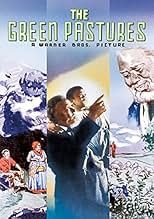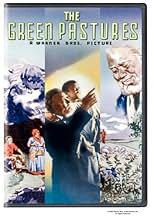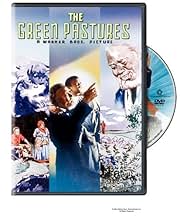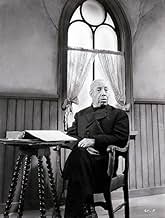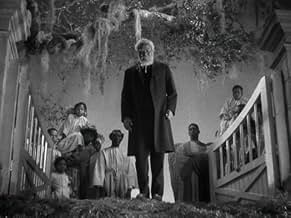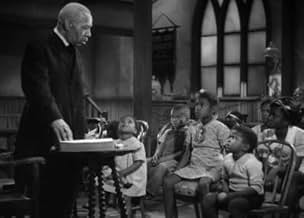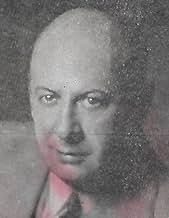Dios, el cielo y varias historias del Antiguo Testamento, incluidas la Creación y el Arca de Noé, se describen supuestamente desde la perspectiva de los estadounidenses negros de las zonas r... Leer todoDios, el cielo y varias historias del Antiguo Testamento, incluidas la Creación y el Arca de Noé, se describen supuestamente desde la perspectiva de los estadounidenses negros de las zonas rurales.Dios, el cielo y varias historias del Antiguo Testamento, incluidas la Creación y el Arca de Noé, se describen supuestamente desde la perspectiva de los estadounidenses negros de las zonas rurales.
- Dirección
- Guionistas
- Elenco
- Premios
- 4 premios ganados en total
Eddie 'Rochester' Anderson
- Noah
- (as Eddie Anderson)
Frank H. Wilson
- Moses
- (as Frank Wilson)
Edna Mae Harris
- Zeba
- (as Edna M. Harris)
Charles Andrews
- Flatfoot
- (as Chas. Andrews)
Billy Cumby
- Abraham
- (as William Cumby)
- …
- Dirección
- Guionistas
- Todo el elenco y el equipo
- Producción, taquilla y más en IMDbPro
Opiniones destacadas
"The Green Pastures" is a far from perfect film and I am pretty sure quite a few folks would be offended by the picture. In fact, the DVD begins with a written disclaimer that explains that the content is offensive when seen today. Obviously, times have changed and the film's patronizing style is out of style in the 21st century--but it's also a film you should see as there really isn't anything like it--even MGM's "Cabin in the Sky". And, in some ways, it's rather beautiful.
The film features an all-black cast--something very unusual for a production from a major studio. It consists of young black children listening to Bible stories and shows the kids' conception of what these events must have been like. The stories are seldom literal--and are quite different from the Biblical originals (such as having only one plague instead of the ten from the story of Moses). But there is also a certain beauty in the stories that show a literal physical God interacting with angels and people on Earth. Sure, it's NOT something that seminary professors would heartily endorse, but the film isn't meant to be literal.
As I said above, the stories are all done with a black cast--even Rex Ingram as God (called 'Da Lawd'). And, although patronizing in style and possessing a few awful stereotypes (such as folks shooting dice), the film is also gentle and good-natured and I assume the film was NOT intended to harm anyone. In other words, the manner is not one to put down black America but perhaps unintentionally minimizes them by often portraying them with a certain child-like innocence. You just have to see it to know what I mean.
So how did this film manage to still get an 8. After all, it surely has a lot of problems! Well, the artistry is the reason. Along with some very nice acting, the film has terrific sets, nice direction and is just lovely. See this one.
The film features an all-black cast--something very unusual for a production from a major studio. It consists of young black children listening to Bible stories and shows the kids' conception of what these events must have been like. The stories are seldom literal--and are quite different from the Biblical originals (such as having only one plague instead of the ten from the story of Moses). But there is also a certain beauty in the stories that show a literal physical God interacting with angels and people on Earth. Sure, it's NOT something that seminary professors would heartily endorse, but the film isn't meant to be literal.
As I said above, the stories are all done with a black cast--even Rex Ingram as God (called 'Da Lawd'). And, although patronizing in style and possessing a few awful stereotypes (such as folks shooting dice), the film is also gentle and good-natured and I assume the film was NOT intended to harm anyone. In other words, the manner is not one to put down black America but perhaps unintentionally minimizes them by often portraying them with a certain child-like innocence. You just have to see it to know what I mean.
So how did this film manage to still get an 8. After all, it surely has a lot of problems! Well, the artistry is the reason. Along with some very nice acting, the film has terrific sets, nice direction and is just lovely. See this one.
I watched this movie late at night with a bunch of munchkins and wondered why more of the adults didn't come watch it with us... It is a unique, well-made, unassuming, enjoyable, surprising, well-told "story." I say "story," because it is a description more than a tale of one way to conceive of the "Lawd of heaven." Gotta love the southern accents. They did a great job and left me rethinking the way I thought of things and smiling as I thought of the way they portrayed it all. It was also curious to me to see how society's perception of music, race, and Sundays has changed, but how some things never change.
Favorite quote... by "The Lawd" - "I'm going ta make me a miracle"
Favorite quote... by "The Lawd" - "I'm going ta make me a miracle"
10Greg-83
I first saw "The Green Pastures" quite by accident as a 13 year-old while visiting grandparents in Detroit, Michigan many, many years ago...I never forgot it.
Years later, in college, while on a date, I was telling my date about it and we stopped by the school library so I could find a copy of the play to show her...she loved it, too. I've since bought the tape and watch it every now-and-then when I want to smile and feel good.
I remember asking my mom about the movie when I first saw it and always remembered her response..."how do you think the little black children in the movie pictured God and others in the Bible?" And that, of course, is exactly what Marc Connelly was trying to get us to think about.
Though the original play/movie may have met resistance in the South, it was a hit in New York. To the eternal historical revisionists of today who see nothing but stereotypes and negative images, I'd suggest you take another look.
Country folk of the early part of this century did talk with accents and few had much education (whites as well as blacks). The dialog of the film is less a contrived stereotype than it is a snapshot of what the simple life was like. It's not hard for me to imagine a dedicated Mr. Deshee teaching kids in Sunday School about the good book. Nor is it hard to understand why they might picture pharoe's guards in double-breasted suits like the gangsters in the news of their youth, or relating any number of other scenes to what was familiar to them.
Connelly was not trying to convert viewers to religion...he was trying to get those already converted to see the personal relationship with God enjoyed by all his children, regardless of their station in life.
There are no whites in the movie, just as there were no whites in the immediate community where the story takes place. This movie was not made with the burden of every social dilemma we've struggled with over the years. To blindly force modern perceptions and racial baggage on it does nothing but dampen the simple joy of this unique gem.
Years later, in college, while on a date, I was telling my date about it and we stopped by the school library so I could find a copy of the play to show her...she loved it, too. I've since bought the tape and watch it every now-and-then when I want to smile and feel good.
I remember asking my mom about the movie when I first saw it and always remembered her response..."how do you think the little black children in the movie pictured God and others in the Bible?" And that, of course, is exactly what Marc Connelly was trying to get us to think about.
Though the original play/movie may have met resistance in the South, it was a hit in New York. To the eternal historical revisionists of today who see nothing but stereotypes and negative images, I'd suggest you take another look.
Country folk of the early part of this century did talk with accents and few had much education (whites as well as blacks). The dialog of the film is less a contrived stereotype than it is a snapshot of what the simple life was like. It's not hard for me to imagine a dedicated Mr. Deshee teaching kids in Sunday School about the good book. Nor is it hard to understand why they might picture pharoe's guards in double-breasted suits like the gangsters in the news of their youth, or relating any number of other scenes to what was familiar to them.
Connelly was not trying to convert viewers to religion...he was trying to get those already converted to see the personal relationship with God enjoyed by all his children, regardless of their station in life.
There are no whites in the movie, just as there were no whites in the immediate community where the story takes place. This movie was not made with the burden of every social dilemma we've struggled with over the years. To blindly force modern perceptions and racial baggage on it does nothing but dampen the simple joy of this unique gem.
I realize that many modern audiences might be turned off by this film due to the politically correct times we live in--probably moreso for the religious references than for the racial stereotypes. Nonetheless, it's a genuine feel-good movie full of love, kindness, and yes, morality. I'd first read the play for a drama class many years ago, and I was absolutely stunned by it, although I figured that I'd never get to see a production of it. Imagine my delight finding it in the video store and actually taking all of it in. BTW--regarding the racial issues here: it continually amazes me how so many people in the African-American community would find this film and "Song of the South" offensive, yet these same people praise Nelly for "Pimpin'" and Ludicrous touting "Ho's in the bedroom." Maybe I'm missing something here, but I don't like itwhen whites tout ghetto stereotypes, and it's just as offensive to me when blacks do it. Yet, we MUST protect the children from "Green Pastures" and "Song of the South" because they perpetuate "racist stereotypes." Okay, I'm off my soap box--rent this film--it's a masterpiece.
The origins of The Green Pastures are from the anthology of stories published by writer Roarke Bradford who entitled his volume Ol Man Adam An' His Chillun. Written in 1928 it was adapted into a play by Algonquin Round Table member Marc Connelly and for an incredible 640 performances during the height of the Depression. In 1936 Warner Brothers purchased the rights and did this film version of the play utilizing a whole load of black players in the film colony.
The Green Pastures got two revivals on Broadway, but you don't hear of it being revived in the post Civil Rights era. It hasn't had the staying power at all of Porgy and Bess which had similar origins.
The story is told from the eyes of a child in a rural black church's Sunday school who is hearing the story of Genesis and imagining what the people would be like in her mind. De Lawd is played by Rex Ingram and this would become two of his career roles, the other being the genie in The Thief Of Bagdad. Personally I can imagine him being God far better than George Burns.
The characters of the Bible are for these people invested with a lot of human qualities, more like the Greek and Roman deities of antiquity than the traditional white Christian view. My favorite scene is the one where the only good man in a world awash with sin is that preacher Noah played by Eddie Anderson. When Ingram visits him and tells him he's starting over and to build an ark and take male and female of everything for breeding, Anderson starts haggling with De Lawd over the amount of spirits to be taken on this sea voyage for medicinal purposes only you understand.
Of course the Ark does its 40 days and 40 nights thing and then just sails around until some land starts to emerge. Personally back in those days polygamy was in and I never understood why Noah and the boys didn't have some extra wives along. The task before them might have been fun, populating the earth again, but it sure put a strain on their wives.
A film like The Green Pastures has a childlike innocence about it, it would have to in order to succeed on stage and screen. It's not likely to see any revivals due to changing times and sensitivities. But it remains an entertaining if quaint vehicle today.
The Green Pastures got two revivals on Broadway, but you don't hear of it being revived in the post Civil Rights era. It hasn't had the staying power at all of Porgy and Bess which had similar origins.
The story is told from the eyes of a child in a rural black church's Sunday school who is hearing the story of Genesis and imagining what the people would be like in her mind. De Lawd is played by Rex Ingram and this would become two of his career roles, the other being the genie in The Thief Of Bagdad. Personally I can imagine him being God far better than George Burns.
The characters of the Bible are for these people invested with a lot of human qualities, more like the Greek and Roman deities of antiquity than the traditional white Christian view. My favorite scene is the one where the only good man in a world awash with sin is that preacher Noah played by Eddie Anderson. When Ingram visits him and tells him he's starting over and to build an ark and take male and female of everything for breeding, Anderson starts haggling with De Lawd over the amount of spirits to be taken on this sea voyage for medicinal purposes only you understand.
Of course the Ark does its 40 days and 40 nights thing and then just sails around until some land starts to emerge. Personally back in those days polygamy was in and I never understood why Noah and the boys didn't have some extra wives along. The task before them might have been fun, populating the earth again, but it sure put a strain on their wives.
A film like The Green Pastures has a childlike innocence about it, it would have to in order to succeed on stage and screen. It's not likely to see any revivals due to changing times and sensitivities. But it remains an entertaining if quaint vehicle today.
¿Sabías que…?
- TriviaThe studio's anxiety about this film's all-Black cast is evident in the film's 3:48 minute trailer. It consists of white actor Dick Powell talking directly to the camera, white workers preparing costumes and props, and author Marc Connelly explaining the rationale for the bare sets to a studio executive. According to Connelly, it is how a "simple, devout" people would imagine heaven. At no time are Rex Ingram or any of the film's other stars shown in the preview, and there is only a brief sequence of black extras in a long shot.
- ErroresOne of Noah's son's rides a zebra that is clearly a donkey or mule made to look like a zebra. Two real zebras are loaded while he rides the fake.
- Créditos curiososGod appears in many forms to those who believe in Him. Thousands of Negroes in the Deep South visualize God and Heaven in terms of people and things they know in their everyday life. The Green Pastures is an attempt to portray that humble, reverent conception.
- ConexionesEdited into Governing Body (2023)
- Bandas sonorasHave You Got Good Religion (Certainly, Lord)
(uncredited)
Traditional spiritual
Performed by the Hall Johnson Choir
Selecciones populares
Inicia sesión para calificar y agrega a la lista de videos para obtener recomendaciones personalizadas
- How long is The Green Pastures?Con tecnología de Alexa
Detalles
- Tiempo de ejecución1 hora 33 minutos
- Color
- Mezcla de sonido
- Relación de aspecto
- 1.37 : 1
Contribuir a esta página
Sugiere una edición o agrega el contenido que falta


